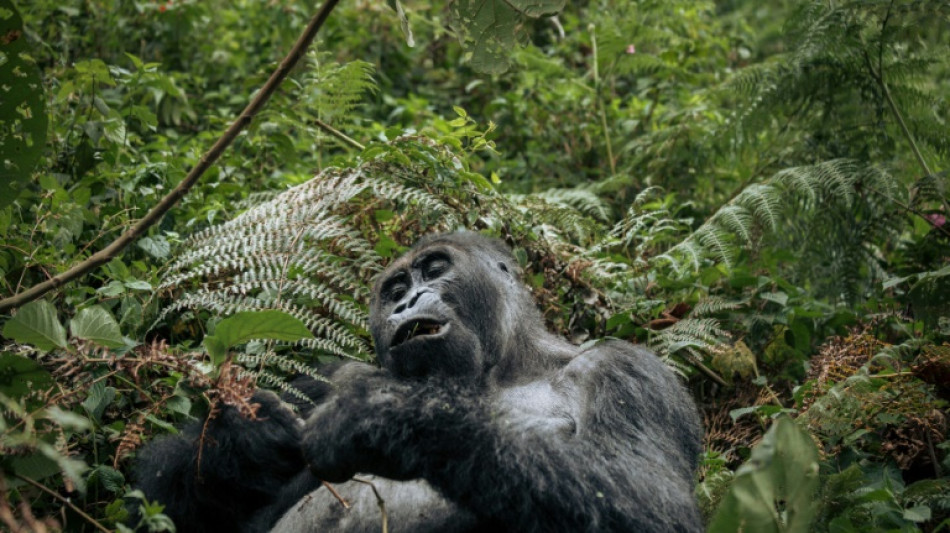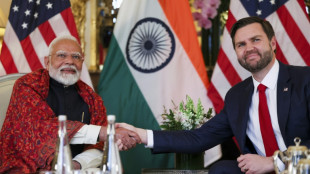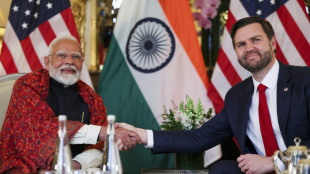
-
 Vance in India for tough talks on trade
Vance in India for tough talks on trade
-
Thunder crush Grizzlies as Celtics, Cavs and Warriors win

-
 Vance heads to India for tough talks on trade
Vance heads to India for tough talks on trade
-
China slams 'appeasement' of US as nations rush to secure trade deals

-
 'Grandpa robbers' go on trial for Kardashian heist in Paris
'Grandpa robbers' go on trial for Kardashian heist in Paris
-
Swede Lindblad gets first win in just third LPGA start

-
 Gold hits record, dollar drops as tariff fears dampen sentiment
Gold hits record, dollar drops as tariff fears dampen sentiment
-
As Dalai Lama approaches 90, Tibetans weigh future

-
 US defense chief shared sensitive information in second Signal chat: US media
US defense chief shared sensitive information in second Signal chat: US media
-
Swede Lingblad gets first win in just third LPGA start

-
 South Korea ex-president back in court for criminal trial
South Korea ex-president back in court for criminal trial
-
Thunder crush Grizzlies, Celtics and Cavs open NBA playoffs with wins

-
 Beijing slams 'appeasement' of US in trade deals that hurt China
Beijing slams 'appeasement' of US in trade deals that hurt China
-
Trump in his own words: 100 days of quotes

-
 Padres say slugger Arraez 'stable' after scary collision
Padres say slugger Arraez 'stable' after scary collision
-
Trump tariffs stunt US toy imports as sellers play for time

-
 El Salvador offers to swap US deportees with Venezuela
El Salvador offers to swap US deportees with Venezuela
-
Higgo holds on for win after Dahmen's late collapse

-
 El Salvador's president proposes prisoner exchange with Venezuela
El Salvador's president proposes prisoner exchange with Venezuela
-
Gilgeous-Alexander, Jokic, Antetokounmpo named NBA MVP finalists

-
 Thomas ends long wait with playoff win over Novak
Thomas ends long wait with playoff win over Novak
-
Thunder rumble to record win over Grizzlies, Celtics top Magic in NBA playoff openers

-
 Linesman hit by projectile as Saint-Etienne edge toward safety
Linesman hit by projectile as Saint-Etienne edge toward safety
-
Mallia guides Toulouse to Top 14 win over Stade Francais

-
 Israel cancels visas for French lawmakers
Israel cancels visas for French lawmakers
-
Russia and Ukraine trade blame over Easter truce, as Trump predicts 'deal'

-
 Valverde stunner saves Real Madrid title hopes against Bilbao
Valverde stunner saves Real Madrid title hopes against Bilbao
-
Ligue 1 derby interrupted after assistant referee hit by projectile

-
 Leclerc bags Ferrari first podium of the year
Leclerc bags Ferrari first podium of the year
-
Afro-Brazilian carnival celebrates cultural kinship in Lagos

-
 Ligue 1 derby halted after assistant referee hit by projectile
Ligue 1 derby halted after assistant referee hit by projectile
-
Thunder rumble with record win over Memphis in playoff opener

-
 Leverkusen held at Pauli to put Bayern on cusp of title
Leverkusen held at Pauli to put Bayern on cusp of title
-
Israel says Gaza medics' killing a 'mistake,' to dismiss commander

-
 Piastri power rules in Saudi as Max pays the penalty
Piastri power rules in Saudi as Max pays the penalty
-
Leaders Inter level with Napoli after falling to late Orsolini stunner at Bologna

-
 David rediscovers teeth as Chevalier loses some in nervy Lille win
David rediscovers teeth as Chevalier loses some in nervy Lille win
-
Piastri wins Saudi Arabian Grand Prix, Verstappen second

-
 Kohli, Rohit star as Bengaluru and Mumbai win in IPL
Kohli, Rohit star as Bengaluru and Mumbai win in IPL
-
Guirassy helps Dortmund past Gladbach, putting top-four in sight

-
 Alexander-Arnold lauds 'special' Liverpool moments
Alexander-Arnold lauds 'special' Liverpool moments
-
Pina strikes twice as Barca rout Chelsea in Champions League semi

-
 Rohit, Suryakumar on song as Mumbai hammer Chennai in IPL
Rohit, Suryakumar on song as Mumbai hammer Chennai in IPL
-
Dortmund beat Gladbach to keep top-four hopes alive

-
 Leicester relegated from the Premier League as Liverpool close in on title
Leicester relegated from the Premier League as Liverpool close in on title
-
Alexander-Arnold fires Liverpool to brink of title, Leicester relegated

-
 Maresca leaves celebrations to players after Chelsea sink Fulham
Maresca leaves celebrations to players after Chelsea sink Fulham
-
Trump eyes gutting US diplomacy in Africa, cutting soft power: draft plan

-
 Turkey bans elective C-sections at private medical centres
Turkey bans elective C-sections at private medical centres
-
Lebanon army says 3 troops killed in munitions blast in south


Wildlife populations plunge 69% since 1970: WWF
Wild populations of monitored animal species have plummeted nearly 70 percent in the last 50 years, according to a landmark assessment released Thursday that highlights "devastating" losses to nature due to human activity.
Featuring data from 32,000 populations of more than 5,000 species of mammals, birds, amphibians, reptiles and fish, the WWF Living Planet Index shows accelerating falls across the globe.
In biodiversity-rich regions such as Latin America and the Caribbean, the figure for animal population loss is as high as 94 percent.
Globally, the report found that monitored animal populations had fallen 69 percent since 1970.
Marco Lambertini, director general of WWF International, said his organisation was "extremely worried" by the new data.
"(It shows) a devastating fall in wildlife populations, in particular in tropical regions that are home to some of the most biodiverse landscapes in the world," he said.
Mark Wright, director of science at WWF, said the figures were "truly frightening", particularly for Latin America.
"Latin America is renowned for his biodiversity of course, it's really important for lots of other things as well," he said.
"It's super important for regulating the climate. We estimate currently there's something like 150 to 200 billion tonnes of carbon wrapped up in the forests of the Amazon."
That is equivalent to 550 to 740 billion tonnes of CO2, or 10 to 15 times more than annual greenhouse gas emissions at current rates.
The index found that freshwater species had declined more than those found in any other habitat, with an 83-percent population fall since 1970.
The report found that the main drivers of wildlife loss are habitat degradation due to development and farming, exploitation, the introduction of invasive species, pollution, climate change and disease.
Lambertini said the world needed to rethink its harmful and wasteful agricultural practices before the global food chain collapsed.
"Food systems today are responsible for over 80 percent of deforestation on land, and if you look at the ocean and freshwater they are also driving a collapse of fishery stocks and populations in those habitats," he said.
With world leaders due to convene in Montreal for the COP15 biodiversity summit in December, the report authors called for an international, binding commitment to protect nature, similar to the 2015 Paris Agreement on climate change.
- 'Need to act now' -
The Living Planet Report argues that increasing conservation and restoration efforts, producing and consuming food more sustainably, and rapidly and deeply decarbonising all sectors can alleviate the twin crises of climate change and biodiversity loss.
It also calls for governments to properly factor into policymaking the value of services rendered by nature, such as food, medicine and water supply.
"We need to stress the fact that nature loss is not just a moral issue of our duty to protect the rest of the world. It is actually an issue of material value, an issue of security for humanity as well," said Lambertini.
Some areas experienced more population loss than others -- Europe, for example, saw a wildlife population decline of 18 percent.
"But that also masks historic, very extreme losses of biodiversity," said Andrew Terry, director of conservation at the Zoological Society of London, which helped compile the data.
"We know that we're coming out of (a) low point in the state of biodiversity in the northern hemisphere."
In Africa, where 70 percent of livelihoods rely on nature in some form, the report showed a two-thirds fall in wildlife populations since 1970.
Alice Ruhweza, Africa regional director at WWF, said the assessment showed how there was a "huge human cost" when nature is lost.
She said young people in particular were concerned about wildlife preservation, and would push governments to implement greater protective measures.
"We have a young, entrepreneurial and increasingly educated population that is showing more awareness around issues of nature," said Ruhweza.
"So the potential for transformative change is really significant. But the time is running short, and we need to act now."
L.Dubois--BTB




